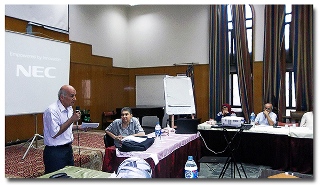Cooperatives as a Tool for Economic Empowerment

In the framework of the campaign adopted by the Egyptian Association for Collective Rights (EACR) to acquaint the public with cooperatives and solidarity economy, the Association organized several seminars that were attended by many civil society organizations and a number of farmers and experts concerned with the conditions of the cooperative movement to discuss the movement and the challenges it faces in Egypt.
Cooperatives represent a fundamental pillar of the economic and societal development of nations. It is a lever for progress, and the foundation of economic empowerment, particularly for poor groups that suffer from economic and social marginalization. In the same framework, the proliferation of the cooperative pattern in production and consumption is conditional on the deepening participatory solidarity economy. Thus, cooperatives are the companion of participatory solidarity economy.
On the other hand, the capitalist production pattern emerges in its neoliberal form, with the accompanying increase in the rate of unofficial economy and labor. Many reports point out that about 60% of the Arab region’s economies are unofficial ones.
This percentage of the unofficial economy is accompanied by the emergence of the unofficial pattern of labor which lacks any form of social protection.
While many initiatives seek to minimize the unofficial pattern of economy and labor, including social safety nets which are based on providing loans for small businesses to reduce the rates of unemployment induced by the privatization policies accompanying the neoliberal pattern of production, conditions have not witnessed any fundamental modifications. Unofficial economies and labor continue to emerge. Instead of complete dependence on the previous economic models, we should search for production patterns to replace prevalent ones. We believe that the solidarity cooperative, participatory economy is one of the most important paths leading to economic empowerment, particularly for the poorest, most marginalized groups.
To ensure the success of this cooperative style, there is a need to adopt its special principles based on the principles of open membership cooperative principles based on free voluntary action. This principle contradicts with obligatory membership, members’ administrative and control democracy, the members’ economic participation, cooperation between cooperatives, in addition to training and continuous learning on part of the cooperative’s members, and the open-ended participatory relationship with the community in which the cooperative exists.
In Egypt, despite the start of the cooperative movement in Egypt more than 100 years ago since 1907, the legislative and political obstacles and constraints, including the absence of a unified democratic law that adopts the principles of cooperation, have prevented the steady growth of a cooperative movement based on free voluntary acts, which calls for the re-institution of the cooperative movement, the cooperative sector and cooperative ownership in a new attempt to infuse life into this economic pattern, one of the most important mechanisms for growth and economic empowerment for communities and nations.
That’s why the Egyptian Society for Collective Rights is keen on communicating with other non-governmental organizations that have cooperatives activities to create a single stream that aims to raise and promote awareness of the true importance of cooperatives and the solidarity economy in Egypt.
|